Leadership Self-Reflection Report: Multicultural Environment Analysis
VerifiedAdded on 2022/10/01
|5
|1072
|180
Report
AI Summary
This report is a self-reflection by a student on their leadership skills, focusing on their experience as a line manager and identifying areas for improvement, particularly in a multicultural environment. The student acknowledges their introverted nature and its impact on communication and empathy, which they believe have hindered their ability to effectively manage and empower the workforce. The report references the importance of communication, resilience to ethnocentric ideologies, and the ability to connect with people in a multicultural setting. The student identifies the need to develop better communication and empathy skills to improve relationships with their team and adapt to diverse cultural backgrounds, ultimately aiming to enhance their managerial effectiveness in a globalized environment. The report concludes with a discussion on the importance of communication and networking in a multicultural environment.
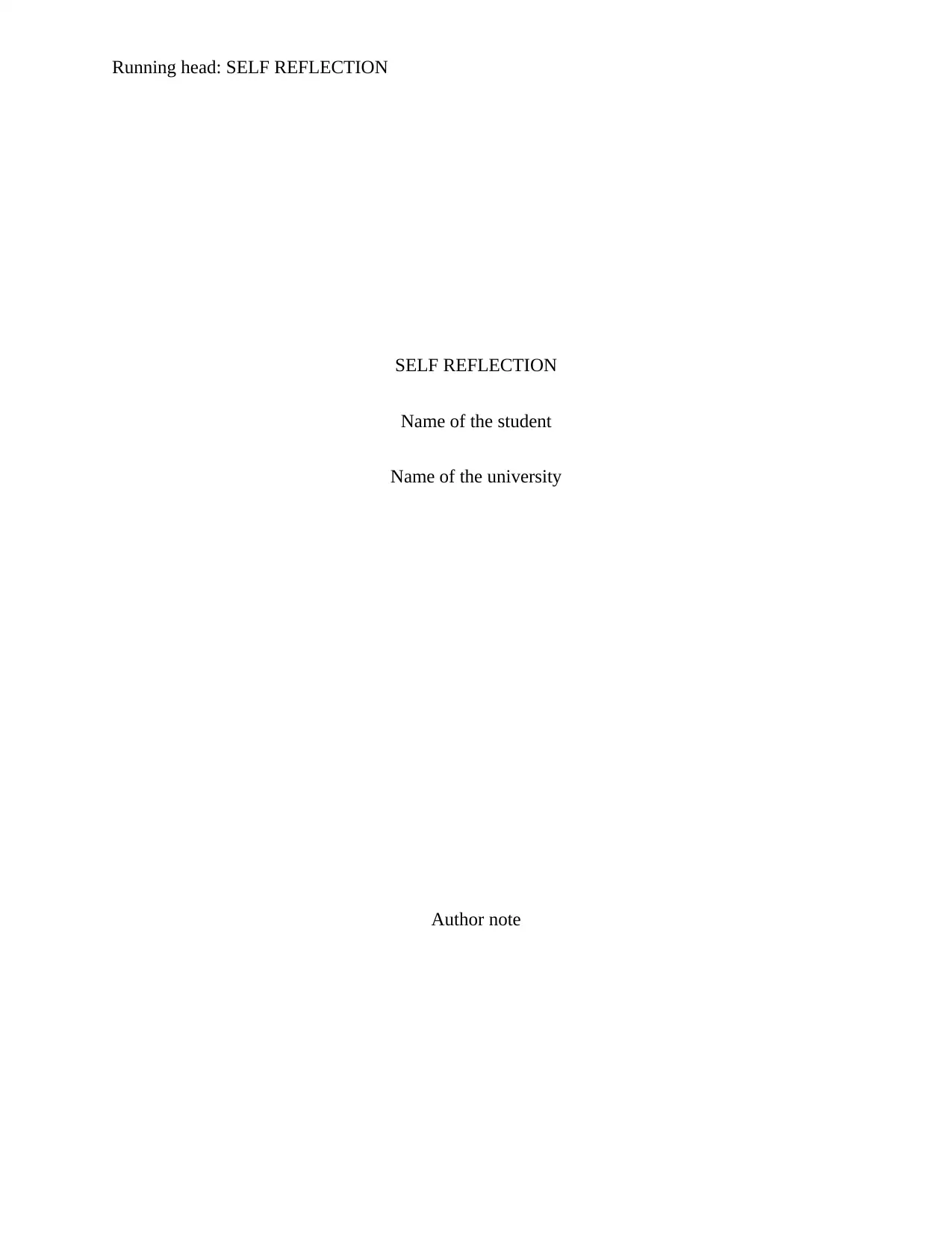
Running head: SELF REFLECTION
SELF REFLECTION
Name of the student
Name of the university
Author note
SELF REFLECTION
Name of the student
Name of the university
Author note
Paraphrase This Document
Need a fresh take? Get an instant paraphrase of this document with our AI Paraphraser
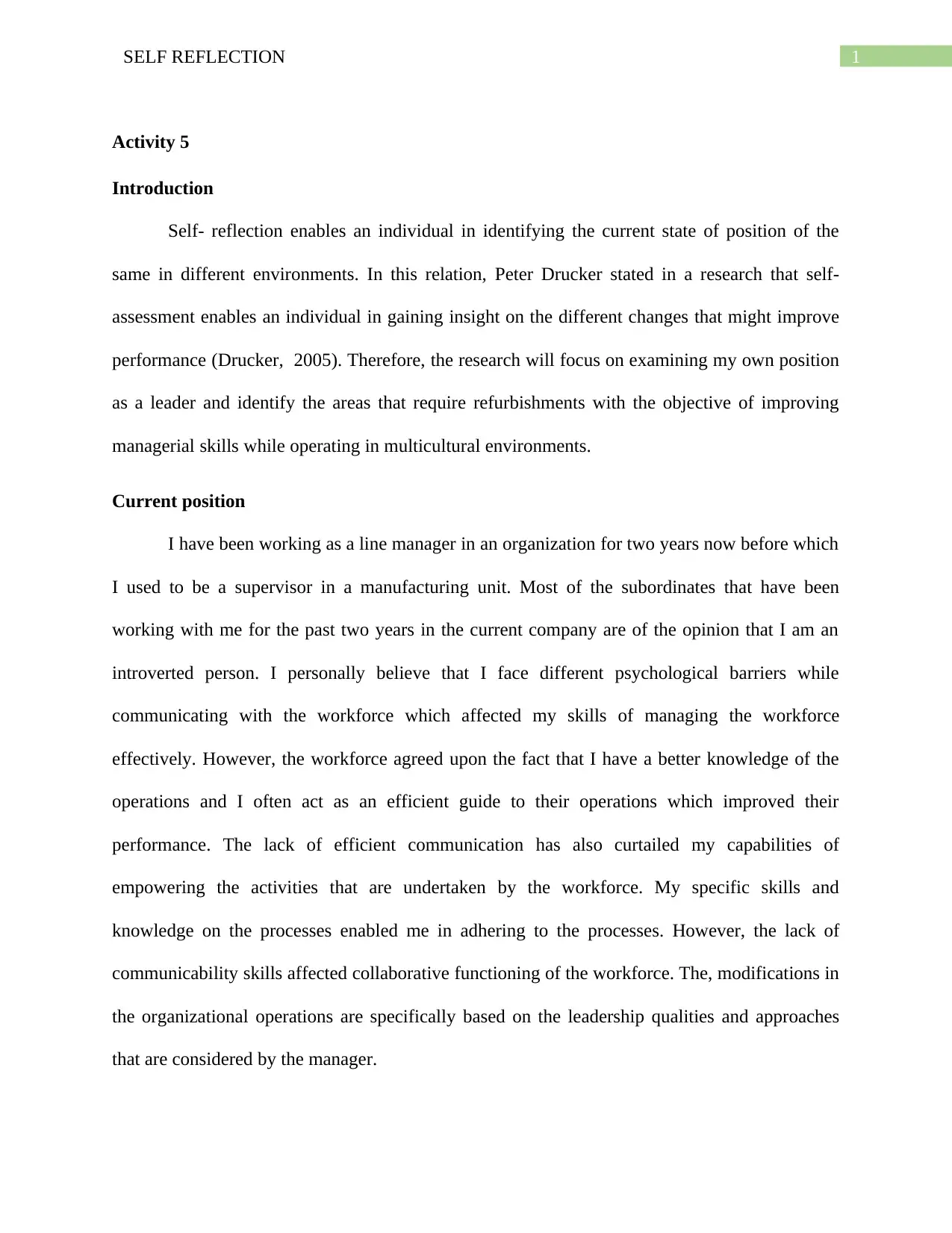
1SELF REFLECTION
Activity 5
Introduction
Self- reflection enables an individual in identifying the current state of position of the
same in different environments. In this relation, Peter Drucker stated in a research that self-
assessment enables an individual in gaining insight on the different changes that might improve
performance (Drucker, 2005). Therefore, the research will focus on examining my own position
as a leader and identify the areas that require refurbishments with the objective of improving
managerial skills while operating in multicultural environments.
Current position
I have been working as a line manager in an organization for two years now before which
I used to be a supervisor in a manufacturing unit. Most of the subordinates that have been
working with me for the past two years in the current company are of the opinion that I am an
introverted person. I personally believe that I face different psychological barriers while
communicating with the workforce which affected my skills of managing the workforce
effectively. However, the workforce agreed upon the fact that I have a better knowledge of the
operations and I often act as an efficient guide to their operations which improved their
performance. The lack of efficient communication has also curtailed my capabilities of
empowering the activities that are undertaken by the workforce. My specific skills and
knowledge on the processes enabled me in adhering to the processes. However, the lack of
communicability skills affected collaborative functioning of the workforce. The, modifications in
the organizational operations are specifically based on the leadership qualities and approaches
that are considered by the manager.
Activity 5
Introduction
Self- reflection enables an individual in identifying the current state of position of the
same in different environments. In this relation, Peter Drucker stated in a research that self-
assessment enables an individual in gaining insight on the different changes that might improve
performance (Drucker, 2005). Therefore, the research will focus on examining my own position
as a leader and identify the areas that require refurbishments with the objective of improving
managerial skills while operating in multicultural environments.
Current position
I have been working as a line manager in an organization for two years now before which
I used to be a supervisor in a manufacturing unit. Most of the subordinates that have been
working with me for the past two years in the current company are of the opinion that I am an
introverted person. I personally believe that I face different psychological barriers while
communicating with the workforce which affected my skills of managing the workforce
effectively. However, the workforce agreed upon the fact that I have a better knowledge of the
operations and I often act as an efficient guide to their operations which improved their
performance. The lack of efficient communication has also curtailed my capabilities of
empowering the activities that are undertaken by the workforce. My specific skills and
knowledge on the processes enabled me in adhering to the processes. However, the lack of
communicability skills affected collaborative functioning of the workforce. The, modifications in
the organizational operations are specifically based on the leadership qualities and approaches
that are considered by the manager.
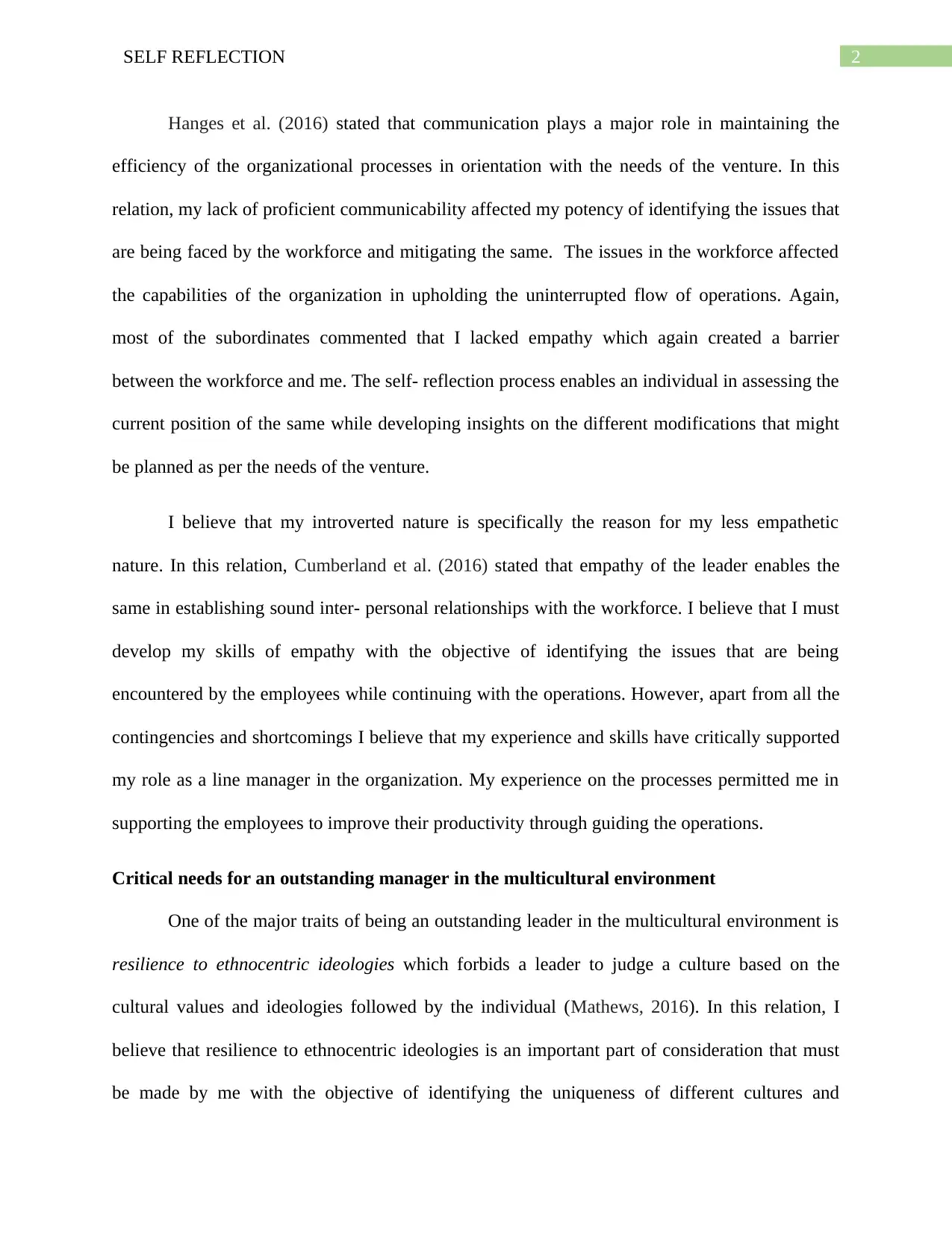
2SELF REFLECTION
Hanges et al. (2016) stated that communication plays a major role in maintaining the
efficiency of the organizational processes in orientation with the needs of the venture. In this
relation, my lack of proficient communicability affected my potency of identifying the issues that
are being faced by the workforce and mitigating the same. The issues in the workforce affected
the capabilities of the organization in upholding the uninterrupted flow of operations. Again,
most of the subordinates commented that I lacked empathy which again created a barrier
between the workforce and me. The self- reflection process enables an individual in assessing the
current position of the same while developing insights on the different modifications that might
be planned as per the needs of the venture.
I believe that my introverted nature is specifically the reason for my less empathetic
nature. In this relation, Cumberland et al. (2016) stated that empathy of the leader enables the
same in establishing sound inter- personal relationships with the workforce. I believe that I must
develop my skills of empathy with the objective of identifying the issues that are being
encountered by the employees while continuing with the operations. However, apart from all the
contingencies and shortcomings I believe that my experience and skills have critically supported
my role as a line manager in the organization. My experience on the processes permitted me in
supporting the employees to improve their productivity through guiding the operations.
Critical needs for an outstanding manager in the multicultural environment
One of the major traits of being an outstanding leader in the multicultural environment is
resilience to ethnocentric ideologies which forbids a leader to judge a culture based on the
cultural values and ideologies followed by the individual (Mathews, 2016). In this relation, I
believe that resilience to ethnocentric ideologies is an important part of consideration that must
be made by me with the objective of identifying the uniqueness of different cultures and
Hanges et al. (2016) stated that communication plays a major role in maintaining the
efficiency of the organizational processes in orientation with the needs of the venture. In this
relation, my lack of proficient communicability affected my potency of identifying the issues that
are being faced by the workforce and mitigating the same. The issues in the workforce affected
the capabilities of the organization in upholding the uninterrupted flow of operations. Again,
most of the subordinates commented that I lacked empathy which again created a barrier
between the workforce and me. The self- reflection process enables an individual in assessing the
current position of the same while developing insights on the different modifications that might
be planned as per the needs of the venture.
I believe that my introverted nature is specifically the reason for my less empathetic
nature. In this relation, Cumberland et al. (2016) stated that empathy of the leader enables the
same in establishing sound inter- personal relationships with the workforce. I believe that I must
develop my skills of empathy with the objective of identifying the issues that are being
encountered by the employees while continuing with the operations. However, apart from all the
contingencies and shortcomings I believe that my experience and skills have critically supported
my role as a line manager in the organization. My experience on the processes permitted me in
supporting the employees to improve their productivity through guiding the operations.
Critical needs for an outstanding manager in the multicultural environment
One of the major traits of being an outstanding leader in the multicultural environment is
resilience to ethnocentric ideologies which forbids a leader to judge a culture based on the
cultural values and ideologies followed by the individual (Mathews, 2016). In this relation, I
believe that resilience to ethnocentric ideologies is an important part of consideration that must
be made by me with the objective of identifying the uniqueness of different cultures and
⊘ This is a preview!⊘
Do you want full access?
Subscribe today to unlock all pages.

Trusted by 1+ million students worldwide
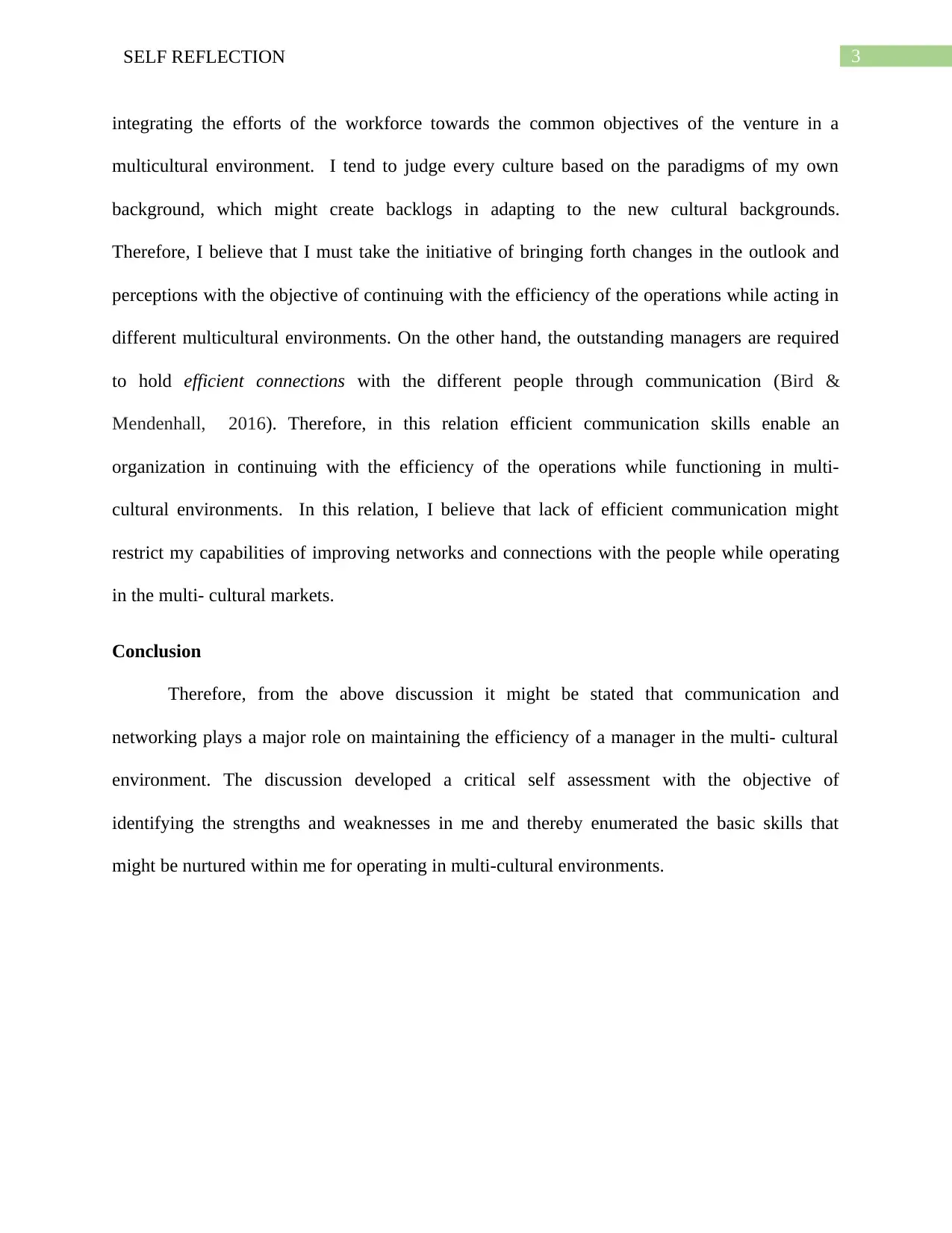
3SELF REFLECTION
integrating the efforts of the workforce towards the common objectives of the venture in a
multicultural environment. I tend to judge every culture based on the paradigms of my own
background, which might create backlogs in adapting to the new cultural backgrounds.
Therefore, I believe that I must take the initiative of bringing forth changes in the outlook and
perceptions with the objective of continuing with the efficiency of the operations while acting in
different multicultural environments. On the other hand, the outstanding managers are required
to hold efficient connections with the different people through communication (Bird &
Mendenhall, 2016). Therefore, in this relation efficient communication skills enable an
organization in continuing with the efficiency of the operations while functioning in multi-
cultural environments. In this relation, I believe that lack of efficient communication might
restrict my capabilities of improving networks and connections with the people while operating
in the multi- cultural markets.
Conclusion
Therefore, from the above discussion it might be stated that communication and
networking plays a major role on maintaining the efficiency of a manager in the multi- cultural
environment. The discussion developed a critical self assessment with the objective of
identifying the strengths and weaknesses in me and thereby enumerated the basic skills that
might be nurtured within me for operating in multi-cultural environments.
integrating the efforts of the workforce towards the common objectives of the venture in a
multicultural environment. I tend to judge every culture based on the paradigms of my own
background, which might create backlogs in adapting to the new cultural backgrounds.
Therefore, I believe that I must take the initiative of bringing forth changes in the outlook and
perceptions with the objective of continuing with the efficiency of the operations while acting in
different multicultural environments. On the other hand, the outstanding managers are required
to hold efficient connections with the different people through communication (Bird &
Mendenhall, 2016). Therefore, in this relation efficient communication skills enable an
organization in continuing with the efficiency of the operations while functioning in multi-
cultural environments. In this relation, I believe that lack of efficient communication might
restrict my capabilities of improving networks and connections with the people while operating
in the multi- cultural markets.
Conclusion
Therefore, from the above discussion it might be stated that communication and
networking plays a major role on maintaining the efficiency of a manager in the multi- cultural
environment. The discussion developed a critical self assessment with the objective of
identifying the strengths and weaknesses in me and thereby enumerated the basic skills that
might be nurtured within me for operating in multi-cultural environments.
Paraphrase This Document
Need a fresh take? Get an instant paraphrase of this document with our AI Paraphraser
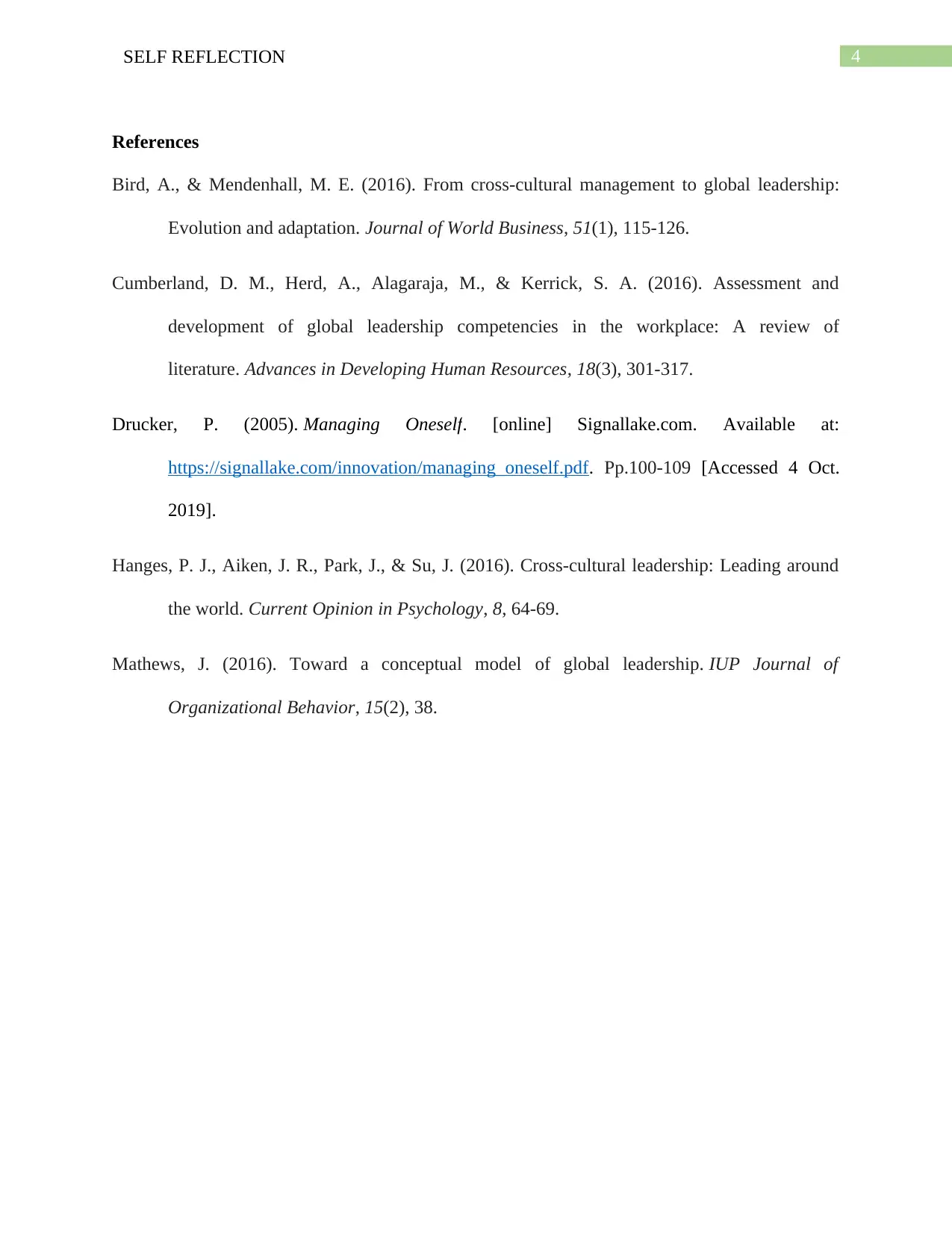
4SELF REFLECTION
References
Bird, A., & Mendenhall, M. E. (2016). From cross-cultural management to global leadership:
Evolution and adaptation. Journal of World Business, 51(1), 115-126.
Cumberland, D. M., Herd, A., Alagaraja, M., & Kerrick, S. A. (2016). Assessment and
development of global leadership competencies in the workplace: A review of
literature. Advances in Developing Human Resources, 18(3), 301-317.
Drucker, P. (2005). Managing Oneself. [online] Signallake.com. Available at:
https://signallake.com/innovation/managing_oneself.pdf. Pp.100-109 [Accessed 4 Oct.
2019].
Hanges, P. J., Aiken, J. R., Park, J., & Su, J. (2016). Cross-cultural leadership: Leading around
the world. Current Opinion in Psychology, 8, 64-69.
Mathews, J. (2016). Toward a conceptual model of global leadership. IUP Journal of
Organizational Behavior, 15(2), 38.
References
Bird, A., & Mendenhall, M. E. (2016). From cross-cultural management to global leadership:
Evolution and adaptation. Journal of World Business, 51(1), 115-126.
Cumberland, D. M., Herd, A., Alagaraja, M., & Kerrick, S. A. (2016). Assessment and
development of global leadership competencies in the workplace: A review of
literature. Advances in Developing Human Resources, 18(3), 301-317.
Drucker, P. (2005). Managing Oneself. [online] Signallake.com. Available at:
https://signallake.com/innovation/managing_oneself.pdf. Pp.100-109 [Accessed 4 Oct.
2019].
Hanges, P. J., Aiken, J. R., Park, J., & Su, J. (2016). Cross-cultural leadership: Leading around
the world. Current Opinion in Psychology, 8, 64-69.
Mathews, J. (2016). Toward a conceptual model of global leadership. IUP Journal of
Organizational Behavior, 15(2), 38.
1 out of 5
Related Documents
Your All-in-One AI-Powered Toolkit for Academic Success.
+13062052269
info@desklib.com
Available 24*7 on WhatsApp / Email
![[object Object]](/_next/static/media/star-bottom.7253800d.svg)
Unlock your academic potential
Copyright © 2020–2026 A2Z Services. All Rights Reserved. Developed and managed by ZUCOL.





